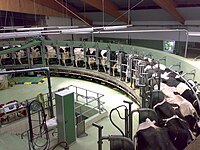
Photo from wikipedia
An overview of recent outcomes of studies indicates an imbalance in the diet of children. Quantitative and qualitative malnutrition of children is the basis of a number of childhood diseases.… Click to show full abstract
An overview of recent outcomes of studies indicates an imbalance in the diet of children. Quantitative and qualitative malnutrition of children is the basis of a number of childhood diseases. The aim of the research was to study the prevalence of small intestine bacterial overgrowth syndrome (SIBO) in children on a long-term dairy-free diet. Material and methods. 40 children aged 7-11 years following a long-term dairy-free diet (average 3 years and 5 months, from 0.5 to 6.3 years) were examined (main group). 30 children who did not follow restrictive diets were consisted control group. In all children, SIBO was determined using a hydrogen breath test with a load of lactulose using a digital analyzer of exhaled hydrogen. Results. The proportion of children with intolerance to dairy products was 32.5%: 10.0% with allergy to cow's milk proteins, and 22.5% with lactose intolerance. 27.5% children followed a dairy-free diet according to an unjustified prescription by physician. 30.0% of children did not consume dairy products because of their unwillingness. 10.0% of children did not consume dairy products due to the unwillingness of their parents. An imbalance in the microbiota of the small intestine during the hydrogen breath test with lactulose loading was detected in 55.0% of children following a long-term dairy-free diet. 22.5% of children complained of recurrent abdominal pain, diarrhea was determined in 10.0%, constipation - in 7.5%, nausea - in 10.0%. In the control group, the SIBO during the hydrogen breath test with lactulose loading was found in 20.0%. Periodic abdominal pain was determined in 10.0%, nausea - in 6.7%, diarrhea - in 10.0%, constipation - in 3.3% children. Conclusion. Thus, among children of primary school age who follow a long-term dairyfree diet, SIBO is significantly more often recorded relative to children who are on a traditional type of diet.
Journal Title: Voprosy pitaniia
Year Published: 2022
Link to full text (if available)
Share on Social Media: Sign Up to like & get
recommendations!